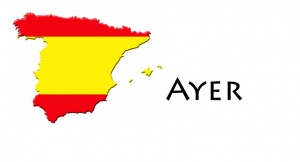Difference between revisions of "Language/Spanish/Grammar/Simple-Past-Tense"
Enmanuel0112 (talk | contribs) |
|||
| Line 1: | Line 1: | ||
[[File:simple-past-spanish.jpg|thumb|none]] | |||
In Spansh, Simple Past Tense is used when something happened in the past and finished in the past. As all verbal tenses in Spanish, Simple Past Tense has a conjugation to the verbs that end in ar, er and ir, corresponding to the subject | In Spansh, Simple Past Tense is used when something happened in the past and finished in the past. As all verbal tenses in Spanish, Simple Past Tense has a conjugation to the verbs that end in ar, er and ir, corresponding to the subject | ||
Revision as of 16:33, 13 January 2017
In Spansh, Simple Past Tense is used when something happened in the past and finished in the past. As all verbal tenses in Spanish, Simple Past Tense has a conjugation to the verbs that end in ar, er and ir, corresponding to the subject
Verbs that End in "Ar"
When you want to conjugate a regular verb that ends in "ar", you need to erase "ar" and put the corresponding ending with the subject, the next table will show you how you can conjugate the verbs that end in "ar" using the verb "to dance" as example.
| Subject | Ending | Bailar |
|---|---|---|
| Yo | é | Bailé |
| Tú | aste | Bailaste |
| Él/Ella/Usted | ó | Bailó |
| Nosotros/Nosotras | amos | Bailamos |
| Vosotros/Vosotras | asteis | Bailasteis |
| Ustedes/Ellos/Ellas | aron | Bailaron |
Verbs that End in "Er"
When you want to conjugate a regular verb that ends in "er", you need to erase "er" and put the corresponding ending with the subject, the next table will show you how you can conjugate the verbs that end in "er" using the verb "to drink" as example.
| Subject | Ending | Beber |
|---|---|---|
| Yo | í | Bebí |
| Tú | iste | Bebiste |
| Él/Ella/Usted | ió | Bebió |
| Nosotros/Nosotras | imos | Bebimos |
| Vosotros/Vosotras | isteis | Bebisteis |
| Ustedes/Ellos/Ellas | ieron | Bebieron |
Verbs that End in "Ir"
When you want to conjugate a regular verb that ends in "ir", you need to erase "ir" and put the corresponding ending with the subject, the next table will show you how you can conjugate the verbs that end in "ir" using the verb "to open" as example.
| Subject | Ending | Abrir |
|---|---|---|
| Yo | í | Abrí |
| Tú | iste | Abriste |
| Él/Ella/Usted | ó | Abrió |
| Nosotros/Nosotras | imos | Abrimos |
| Vosotros/Vosotras | isteis | Abristeis |
| Ustedes/Ellos/Ellas | ieron | Abrieron |
Some Irregular Verbs
As you know, in Spanish exists a lot of irregular verbs, those change their form and use the same endings like "soñar" or "mover". And there are verbs that change completely, like "tener".
| Subject | Soñar |
|---|---|
| Yo | Soñé |
| Tú | Soñaste |
| Él/Ella/Usted | Soñó |
| Nosotros/Nosotras | Soñamos |
| Vosotros/Vosotras | Soñasteis |
| Ustedes/Ellos/Ellas | Sueñan |
| Subject | Mover |
|---|---|
| Yo | Moví |
| Tú | Moviste |
| Él/Ella/Usted | Movió |
| Nosotros/Nosotras | Movimos |
| Vosotros/Vosotras | Movisteis |
| Ustedes/Ellos/Ellas | Mueven |
And there are verbs that change completely, like "tener".
| Subject | Tener |
|---|---|
| Yo | Tuve |
| Tú | Tuviste |
| Él/Ella/Usted | Tuvo |
| Nosotros/Nosotras | Tuvimos |
| Vosotros/Vosotras | Tuvisteis |
| Ustedes/Ellos/Ellas | Tuvieron |
